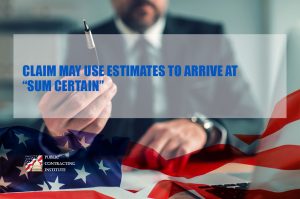This blog recently discussed a Federal Circuit decision which held that a contractor’s claim does not accrue until the exact amount (“sum certain”) of the claim is known to the contractor. Kellogg Brown & Root Serv. Inc. v. Murphy, 823 F.3d 622 (Fed. Cir. 2016). The blog was titled “Claim Does Not Accrue Until ‘Sum Certain’ is Known by Contractor.” Without contradicting this basic requirement for a sum certain in claims under the Contract Disputes Act (“CDA”), the Armed Services Board of Contract Appeals (“ASBCA”) has reiterated that the use of estimated or approximate costs in determining the value of a claim is permissible as long as the total overall demand is for a sum certain. Government Services Corp., ASBCA No. 60367, June 20, 2016.
In Government Services, the appellant submitted a certified claim to the Defense Logistics Agency-Energy (“DLA”) alleging that a negative Contractor Performance Assessment Report System (“CPARS”) rating it had received violated the covenant of good faith and fair dealing.
When DLA requested “detailed substantiating records,” the contractor responded by letter as follows:
“The ‘numerical calculation of $100,000.00’ was derived by a simple mathematical formula of estimating the future expense, both administrative and legal, that is expected to be required to counter the apparent bad faith libelous actions of the [contracting officials] which are the subject of the claim.
“The good faith estimate was reached after considering the number and frequency of bid submittals by [contractor] on solicitations that require consideration of past performance ratings such as those contained within the CPARS. This calculation was then further refined by the applicable life of the subject CPAR (discounting the 15 month remaining suspension of GSC) and the cost; both administrative and legal, of addressing the issue with future [contracting officials].”
The government sought to have the claim dismissed for lack of jurisdiction because the claim “did not include a sum certain.” The ASBCA rejected this theory, noting that the claim itself used no qualifying language (such as “estimate”), and the Board jurisdiction is determined by the adequacy or sufficiency of the actual claim, not by information outside of that claim, such as information in the notice of appeal or complaint submitted to the Board. The Board held that the use of estimated language in the claim itself would render a claim improper, but the use of estimated or approximate costs in determining the value of a claim is permissible so long as the total overall demand is for a specific sum certain.
The conclusion is clear: contractors must make a claim (i.e. a demand) for an exact sum certain, not an approximate amount. However, in developing that certain sum, the contractor may use a reasonable method to approximate or estimate the supporting elements.

